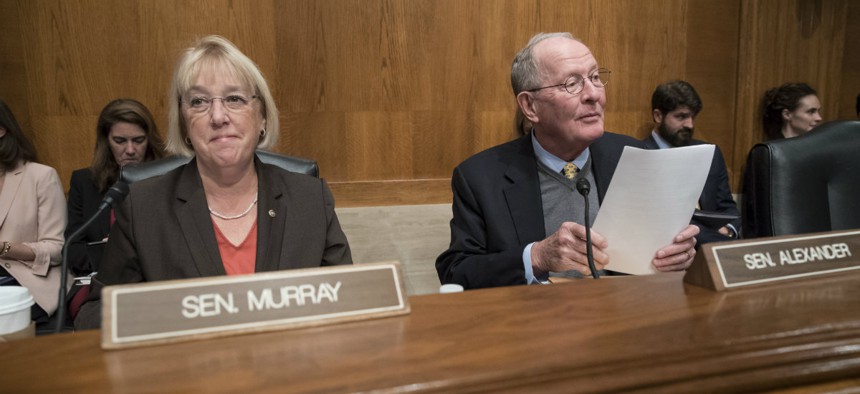CBO: Bipartisan Health Bill Could Lead to More State ACA Waivers

Sen. Patty Murray, the ranking member, and Sen. Lamar Alexander, chairman of the Senate Health, Education, Labor, and Pensions Committee (AP Photo/J. Scott Applewhite)
Under the Alexander-Murray proposal, states would no longer be required to enact legislation before applying for a waiver. Some Department of Health and Human Services standards used to evaluate applications would be changed, too.
The Congressional Budget Office on Wednesday released its analysis of the Bipartisan Health Care Stabilization Act of 2017, or the Alexander-Murray bill, as it’s more commonly called.
The bill is named for its chief co-sponsors, U.S. Sen. Lamar Alexander, a Tennessee Republican who chairs the Senate Health, Education, Labor and Pensions Committee and that panel’s ranking member, Washington Democrat Patty Murray.
Among other impacts, the bill would appropriate the cost-sharing reductions payments that subsidize insurance coverage for low-income consumers and would grant state governments increased flexibility in the form of access to waiver requests.
According to the CBO, the bill would have no major impact on the number of people covered by insurance over the next ten years.
The CBO also found that the bill would reduce the federal deficit by $3.8 billion over the next decade. This figure, however, does not tell the whole story because of the way the CBO is obligated to measure their baseline. In its evaluation of Alexander-Murray, the CBO assumed that the cost-sharing reductions, which President Trump halted on Oct. 12, would be paid. In a previous estimate, the CBO found that cancelling these CSR would increase the federal deficit by $196 billion over the next decade.
According rough calculations from Loren Adler, associate director at the Brookings Institution's Center for Health Policy, if the CBO had taken into account a baseline with no CSR payments, the Alexander-Murray bill, which appropriates those funds for the next two years, would save the federal government a total of about $10 billion, rather than $3.8 billion.
Along with appropriating the CSR payments, the bill also alters some of the protocols for state governments seeking innovation waivers under Section 1332 of the Affordable Care Act. These waivers allow states to attempt to find ways to provide quality health coverage while retaining Obamacare’s basic protections. Under this proposed piece of legislation, states would no longer be required to enact legislation before applying for a waiver, and some of the standards the Department of Health and Human Services uses to evaluate these applications would be changed.
The CBO estimates that these alterations would result in an increase in the number of 1332 waiver applications from states, and that the likelihood these waivers would be granted would go up as well.
At the end of the day, however, Alexander-Murray remains in limbo. The bill may have the votes to pass through the Senate, but the future is less bright in the House of Representatives. Republicans in that chamber have come out against the proposal, which is seen as a way to prop up the Affordable Care Act, rather than repeal it. The president himself has been non-committal on the legislation—appearing to support it one day, and condemn it the next.
Quinn Libson is a Staff Correspondent for Government Executive’s Route Fifty and is based in Washington, D.C..
NEXT STORY: Cities Make LGBTQ Equality Gains Despite More Hostile State Political Climates






